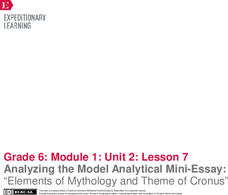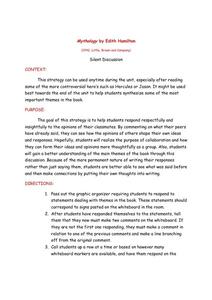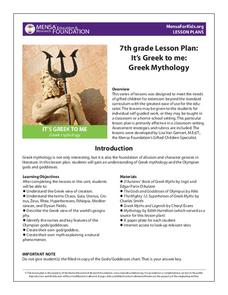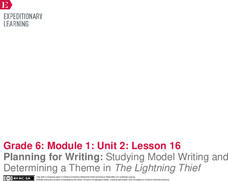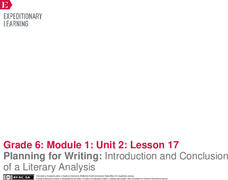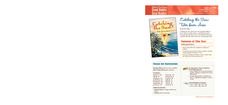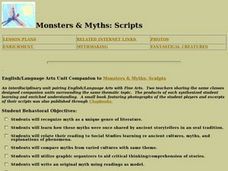EngageNY
Analyzing the Model Analytical Mini-Essay: “Elements of Mythology and Theme of Cronus”
It's time to make a claim. Scholars learn what it means to make a claim by first looking at a model analytical mini-essay to determine how the author relayed ideas. Pupils then work with partners to discuss how the author might have...
EngageNY
Drafting an Analytical Mini-Essay: Using Partner Talk and Graphic Organizers to Guide Thinking
Moving on up ... Scholars take a look at how the author of the model essay Elements of Mythology and Theme of Cronus moved up in the writing process from a graphic organizer to an essay. After walking through the writing process of the...
Curated OER
Mythology by Edith Hamilton: Silent Discussion
Get everyone up and participating! High schoolers reading Mythology, by Edith Hamilton, complete a graphic organizer independently, and then record one of their thoughts on the white board for a silent discussion. Decide how you're going...
Curated OER
It’s Greek to Me: Greek Mythology
Here you'll find a great collection of worksheets to supplement your instruction of Greek mythology, including informational texts on the Olympian gods and goddesses, a matching quiz, graphic organizers, and myth-writing activities.
Curated OER
Mayan Myths/Folktales
Middle schoolers work on summarizing a story, and they determine if it is a legend, a myth, or a fable. Working in groups to read and summarize stories, they then list evidence whether the tale is a myth, fable, or legend. They present...
EngageNY
Planning for Writing: Studying Model Writing and Determining a Theme in The Lightning Thief
A theme runs through it. Scholars analyze how a common theme runs through the myths they have read and The Lightning Thief. They complete graphic organizers and view a four paragraph model essay. They analyze the essay for structure and...
EngageNY
Analyzing How Shakespeare’s Play Draws upon Greek Mythology: Part 2
Pupils explore the narrative structure of a piece of literary text, mapping out the plot structure of the Greek myth "Pyramus and Thisbe." Next, they use their completed graphic organizers to write story summaries.
EngageNY
Planning for Writing: Introduction and Conclusion of a Literary Analysis
It's all about the introduction. Scholars work on the introductory paragraph for their essays, connecting the theme of a myth and The Lightning Thief. They use a graphic organizer to help focus their work and then move to working on the...
Pearson
Catching the Sun: Tales from Asia
Explore the folklore of Asia and the South Pacific with this language arts lesson series. Complementing a reading of Catching the Sun: Tales from Asia by Jan M. Mike, this resource supports learners with understanding cause and effect...
Curated OER
Monster and Myths: Scripts
Students explore characteristics of the myth genre. In this myth lesson, students become familiar with various myths and the cultures they were derived from. Students compare in a graphic organizer. Students write original myths and...
Curated OER
I'm a Changed Pig
Introduce your class to fairy tales with this lesson. After reading the fractured fairy tale, "The Three Little Wolves and the Big Bad Pig," third, fourth, and fifth graders write a personal narrative as a response to the fairy tale....
Channel Islands Film
Dark Water: Lesson Plan 3 - Grades 6-12
After watching the documentary Dark Water about a traditional Chumash ceremony and reading a Chumash origin story, viewers are asked to create a coat of arms and to craft an essay that details a family tradition or their own origin story.


